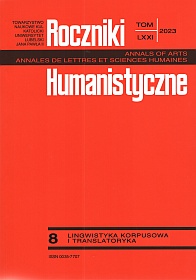Krytyka ethosu ru 儒 w Daodejingu
Criticism of Ru’s 儒 Ethos in Dao De Jing
Author(s): Katarzyna PejdaSubject(s): Philosophy, Non-European Philosophy, East Asian Philosophy
Published by: Towarzystwo Naukowe KUL & Katolicki Uniwersytet Lubelski Jana Pawła II
Keywords: early Confucian thought; early Daoist thought; Daodejing; Confucian ethos; criticism of Confucian morality
Summary/Abstract: The Dao De Jing is a text traditionally attributed to the Daoist school of early Chinese thought. There are two dominant terms in this text – dao and de – which appear in every school of early Chinese thought, but in Daoism they are connected with mysticism. The Dao De Jing discusses the oneness of dao, which is shared by giving names to things that cannot endure, because reality itself is constantly changing. Using names or language which is inadequate to describe the reality of dao creates a superficial social world – and, for that, Daoists blame the Confucian school of thought. The main aim of this article is to analyse this criticism of the Confucian ethos, its main ideas of self-development in a social context and the acquirement of social skills, as well as of adjusting oneself to dao, understood as the traditions of Former Kings and the natural order. Daoists claim that Confucian teachings divert us from dao by creating a partial reality and morality which is merely a substitute for the undivided reality of dao, as language becomes a tool for social control. Instead of natural dao and its attributes – spontainety ziran, and non-action wuwei – the Confucian morality of ren appears. This is the main concern for the authors of the Dao De Jing, who call for the abandonment of knowledge, i.e. of Confucian moral rules, and for a return to the newborn child’s state of mind.
Journal: Roczniki Humanistyczne
- Issue Year: 71/2023
- Issue No: 9
- Page Range: 39-54
- Page Count: 16
- Language: Polish

